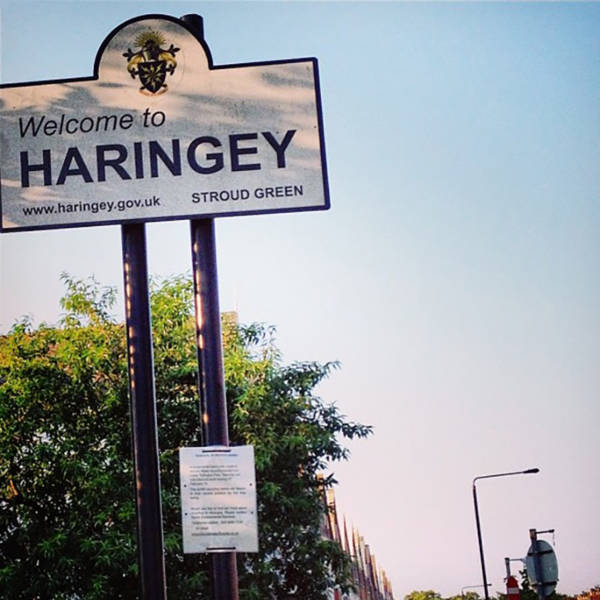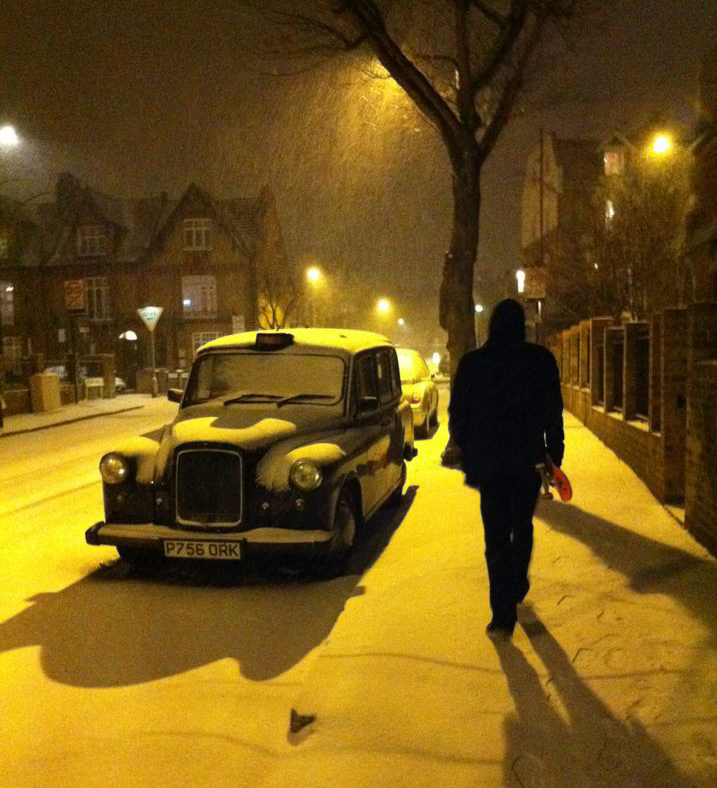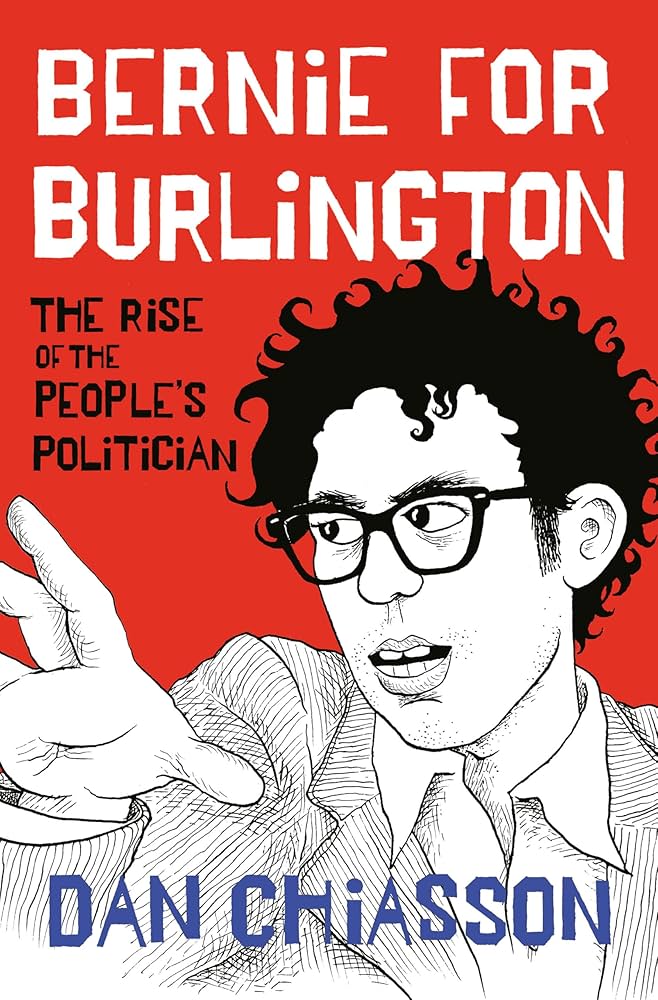I first went to London as an undergrad, on a yearlong study abroad program in University College London’s intimidating English department. When I returned very reluctantly to the US, I often dreamed about London, but in those dreams I would find familiar places moved, distorted, and the people I missed not where I looked for them. After graduation, I moved again to the UK for a master’s program, but mainly to get back to London. I had discovered, after a few panicky weeks of foreign disorientation, that the city suited me—and also that my quiet home in Massachusetts no longer did. At 22, one seemed to preclude the other; London felt strange and exotic in a way that had become a daily necessity.
I studied, got a part-time job teaching SAT prep to rich expat kids, and lived in a tiny, mouse-ridden flat in North London. I read dusty used books picked up for £1 in a charity shop. Eventually I settled in with my new boyfriend, an old friend from my time bartending as a broke study-abroad student. Henry and I lived in a big, messy house in Finsbury Park with four of his friends. Because it was the first place where I learned to be a real adult (signified to me mainly by the odious task of grocery shopping), this part of London automatically became home. After getting my MA, I was allowed to stay and work on the now-defunct Post-Study Work Visa—a relic of the waning Labour government and the death rattle of immigration-friendly Britain. When the lease was up, Henry and I got our own little flat in a converted Baptist church around the corner, and two kittens to go in it. The colorful stained glass windows glowed in the summer and perspired in the chilly winter damp, marking the floors with puddles of condensation.
My life in London was exhilarating, but also taxing, wearing, in a way that I couldn’t at first identify. Eventually I realized that it was the distance from my family that was tiring, a feeling like being tethered but not firmly on the ground. Henry would often recognize this fatigue in me before I did. Then we would tighten our belts for a month, and start looking for cheap flights back. We jokingly called it our “austerity” month, echoing the conservative party refrain of that time.
Visiting home was always a chaotic blur, stressful and wonderful, trying to see every far-flung friend and relative in a week. In those years I had frequent, anxious dreams about being late for my flight back to London after a visit—rushing, packing, driving, and then realizing that I’d forgotten to say goodbye to my great aunt down the road, or hug my grandfather before leaving. I still have these dreams occasionally, even though I’ve moved back and many of the people I dream about forgetting are gone.
On one trip home, my grandfather generously gave me his United air miles. My grandparents had used their miles to travel for decades, and we had all heard the stories of their trips around the US and abroad. But when Henry arrived for our first family Christmas together, my grandfather’s stories abruptly shifted. He began to sketch for us his time as a GI in London at the end of World War II—learning to drive, learning to drink, on his own for the first time. Stories entirely new to me.
As a kid growing up in Natick, Massachusetts, his first job was sewing baseballs by hand after school. At 17, he wanted to enlist with friends but was made to finish school by his mother. When he finally joined the Navy, it got him three weeks of violent seasickness on a ship to England. By the time they docked the war was winding down, so they weren’t sent to the continent. He remembered standing guard in London at the American Embassy, where he met Eleanor Roosevelt, and at Hyde Park Corner.
He told us about living in a little flat with another sailor, with only intermittent heat because of their constant shortage of coins for the coin-operated heating. It was in a mews off Edgware Road in the west part of central London. The landlady at their local pub would play “Anchors Away” on the piano when they walked in, which was often. At the end of the night, they’d trace the wall back to their flat, unable to see much in the pea soup fog of coal-burning London.
When my grandparents visited London in retirement, they were disappointed to find that the pub off Edgware Road had become a television store. For Henry and me, Edgware Road was a busy Lebanese area of shisha cafes and the best late-night shawarma, blending at its southern end with the posher neighborhoods surrounding Oxford Street. It is sometimes now called Little Beirut, or Little Cairo.
My grandfather also spoke about the time he spent in Weymouth, a port town on Britain’s southern coast. While on an unarmed delivery boat, he and his shipmates accepted the surrender of a German U-boat, which surfaced directly in front of them in Portland Harbor. The war had just officially ended, and he said they’d hoped the U-boat had heard that news. It had, of course, and was flying the black flag of surrender. Miraculously, there is grainy video footage of U-boat surrenders in that very harbor. My grandfather remembered that the Germans on this U-boat were eager to surrender to the Americans, sure that the battered British would be harder victors after losing so much to the Luftwaffe. (Some of the surrendered submarines were later paraded up the coast for people to board, tour, and gloat over. About a quarter of the 156 surrendered subs were refitted for other use; the rest were sunk in the sea off North Ireland in Operation Deadlight. Some were in such bad shape that they sunk of their own accord before reaching the appointed spot.)
Thanks to his service and the GI Bill, my grandfather went to college, the first and only in his family to do so. He became an engineer, earned a PhD, and eventually rose to the head of a leading army research facility that developed ready-to-eat meals, bulletproof textiles, and other military technologies. But his grandchildren, much to his teasing protestations, were not scientifically minded; one and all humanities majors, now teachers, writers, editors, entrepreneurs. I always loved him but I did not always feel that I knew him well. He and my grandmother lived a few hours away in New Hampshire for most of my life, so they were the family we saw occasionally, not every day. It had certainly never occurred to me, when I decided to move an ocean away, that it would be a thing that brought me closer to him. But each trip home triggered more memories of this important city we shared, six decades apart. We both laid out our experiences—food, geography, people—and then compared to see where the versions overlapped or diverged.
I occasionally found myself in the London spots he had described. For one week in 2010 I tutored a Swiss teenager in her luxe Mayfair hotel room, which brought me past the American Embassy in beautiful, green, silent Grosvenor Square. The Embassy had become more restrictive since the 1940s, with imposing black gates, iron fencing, and street barriers to prevent any approach. But I could easily imagine Eleanor Roosevelt hurrying in past the rapt, clean-shaven face of a GI in dark blue Navy uniform, stopping to shake hands on the stone steps just before going inside.
Often there was a more visible disconnect between my grandfather’s London and mine. I once went on a ghost tour in the oldest part of the city. It was during my first semester in England, before I developed a local’s vanity and would rather die than be seen doing anything on a tourist’s to-do list. The leather-jacketed guide led us from St. Paul’s Cathedral through the dark to St. Bartholomew’s Hospital. It was first set up as a hospital in the 16th century, after Henry the 8th agreed it could stay as long as it wasn’t a monastery. That early hospital, the guide told us, was built much lower than the modern ground level we were standing on. Nurses and patients who spot the Elizabethan doctor now haunting St. Bart’s see his shadowy body only from the waist up, legs and feet presumably ghosting over the original floors several feet below.
After every trip stateside, I would return to London thinking about my grandfather’s version of the city. I walked to the stations and the store at street level, but I also saw dim traces of his streets below, blackened with soot and so alien to a teenager from Natick. Perhaps his first misgivings of strangeness and disorientation had also quickly grown into a taste for the newness, exotic and enticing. Maybe it was hard for him, too, to go back to Massachusetts, to start and stop a life because someone else says time’s up. I don’t know, I never asked.

Whenever we went back home for a visit, Henry and I would pick out one or two bottles of English ale from the corner shop, and bundle them in socks and shirts in our suitcases. My grandfather would joke, of course, about drinking them warm. By the time my visa expired and we returned to the States, it was just starting to be possible to find a few English ales at the bigger liquor stores, and we would bring him what we could find.
Henry and I live in Massachusetts now, in the town where I grew up. I no longer feel suffocated by the place which at 22 was so impossible. It is scenic, quiet, serene, and the black night sky is still a novelty to me, even though we’ve been here nearly four years. We return to London when we can, but the United air miles are gone and flights became exorbitant when gas prices rose a few years ago. We want to move back someday, and so make distant plans, talk visas, so it feels less dreamlike.
Our old neighborhood is mostly the same, yet it shows small signs of change each time we visit. It’s gentrifying and pricier, like all of London, but still very Turkish and very familiar. We see friends and family, go to weddings, have drinks in our local pub and pizza at Pappagones (“Itsa nice’a place to stuffa your face”). The last time we visited, we walked around the south end of Edgware Road, looking for the pub-turned-TV store that my grandfather had told us about. The spot now hosts chain coffee shops and also a vape store—a recent novelty to which I can vividly imagine my grandfather’s withering reaction. My own reaction is more complex. I know the city is adding new layers at street level, as always, but I’m surprised they don’t belong to me anymore; I am an ex-expat. I can only visit and remark upon them.
Emily Everett is managing editor of The Common. Her stories have appeared in The Kenyon Review, Electric Literature, Tin House Online, Mississippi Review, and other journals. After studying literature, language, and music at Smith College and University College London, she received her MA in British literature from Queen Mary University of London.
Photos by author.





